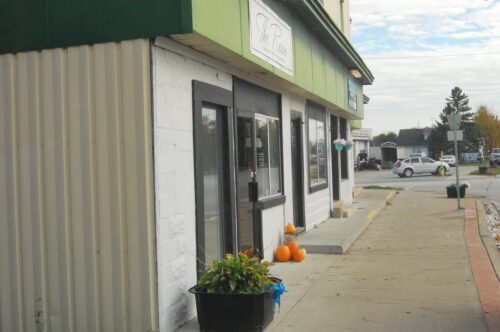
Photo by Max de Liberato
The local economic structure is facing difficulty while communities remain in restricted business capacity. With the second wave of COVID-19 announced, some local businesses may face even more difficulties if lockdowns revert to Stage 1 like they have in Ottawa, as well as Toronto and surrounding areas.
According to the latest reports from CBC at the time of this writing, COVID cases in Ontario are on the rise. Most of these cases are being seen in the Toronto, York and Peel regions of the province. These regions have been put back into modified earlier stages of reopening by the Provincial Government.
As of this writing, Windsor/Essex has moved into a “Yellow-Protect” COVID-19 restriction category, limiting all gatherings, relative to precautions required by the provincial government to cease the disease’s spread.
The Kingsville Times was able to interview several people in the area about the challenges local businesses are facing.
Jocelyn Battersby
Owner and Stylist at The Room Salon Spa Wellness, Cottam
Jocelyn Battersby told The Kingsville Times that her business was shut down during the initial lockdown and everyday operations have been impacted due to the coronavirus.
“COVID restrictions definitely impacted our everyday, since clients are not only nervous to come out for esthetic services, but we cannot book as many clients in a day since we need to allow 15-30 minutes between each client for disinfecting,” said Battersby.
“We have of course heightened our disinfection. After every client everything needs to be disinfected. But our cleaning of tools and stations have always been above and beyond general cleaning standards, even before COVID.”
Battersby said that she as a small business owner is concerned like many others as to whether there might be a second lockdown. Such a development would restrict the ability of these businesses to stay open, and leave them with the dilemma of having to make rental payments without an income.
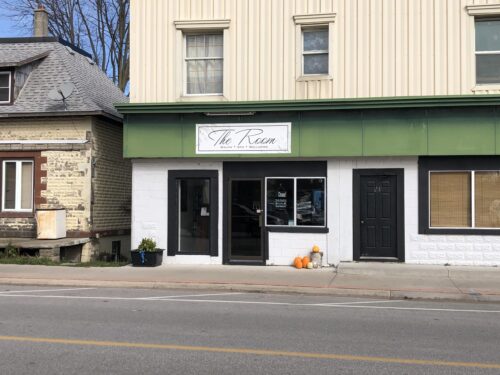
Photo by M.E. Havlik
Battersby said that there was, of course, a learning curve when it came to operating under COVID restrictions, especially for the close contact service provided by the salon.
“It’s getting used to working with PPE, social distancing and plexiglass protection,” she said.
The Canadian government has granted aid for businesses not only in CERB payouts, but has also offered assistance in PPE expenses, according to Battersby.
“As restrictions loosen we do not budge on protocol. Unfortunately this is a fragile state we are in with COVID-19. The issue is people getting ‘tired’ of protocol and getting lazy in disinfecting and social distancing, and that’s when numbers rise and things continue to get out of control,” she said.
“Unfortunately it’s all or nothing in the industry. No matter how few or many clients we take, our building rental is the same amount at the end of the month.”
Battersby stressed that it is important to stay safe and be smart in order to make it through COVID together. “We aren’t here to break each other down, we are here to rebuild together as a community.”
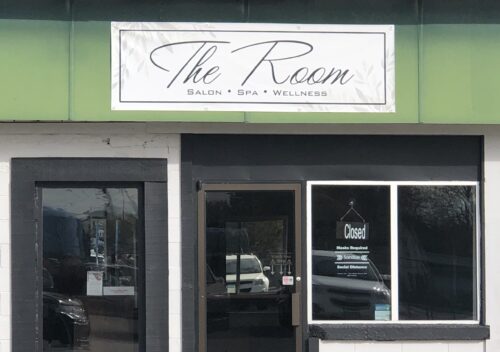
Photo by M.E. Havlik
Sue Stephens
General Manager/Personal Training Manager at Movati Fitness, Kingsville
Sue Stephens told The Times that the Kingsville gym’s initial shutdown after being deemed non-essential caused a loss in revenue.
“With the initial lockdown, we closed our doors. Our staff was compensated by Movati for a couple of weeks after shutting down. We did not foresee just how long the lockdown would be,” said Stephens. “Movati took the stance of putting all memberships on hold until we reopened our doors.”
Movati has strict cleaning protocols in place and the layout of the gym has been set up for social distancing, she said. The gym members play a big part in practicing proper hygiene, wiping down equipment before and after use as well as wearing masks. They also have a cleaning crew in place for regular disinfection of the premises.
“The atmosphere is positive and people feel safe. Other than having to wear masks and follow COVID protocol, we are business as usual. We can only hope we don’t enter a second lockdown,” said Stephens.
“The financial impact it would have on our staff is the biggest concern. Closing fitness facilities again would have a huge impact on our community’s physical and mental health.”
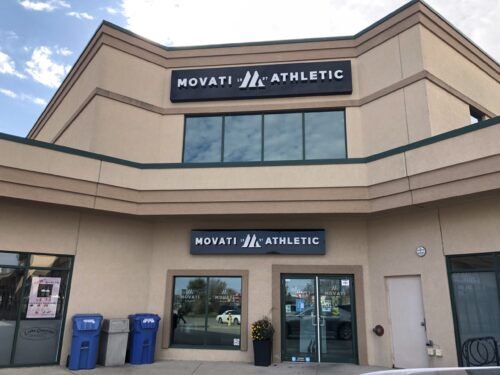
Photo by M.E. Havlik
“The government should see fitness facilities as an essential service. Movati holds a high standard and goes above and beyond what is required to make sure our members are safe,” said Stephens. “The importance of exercise should not be underestimated, it helps improve your immune system and is vital for physical and mental health.”
Stephens knows that the organization must follow government guidelines even in the event of a second lockdown. In the meantime, Movati is welcoming back members, both returning and new.
“We’ve gained the trust of our members,” she said. “We will continue to enforce all protocols and procedures as well as help our community stay healthy.”
Movati, Stephens said, is at the top level of cleanliness and disinfecting. The gym is also able to provide contact tracing.
“I can’t stress the importance of keeping fitness clubs open! We should not all be painted with the same brush. If a business is not following protocol then they should be shut down — not everyone,” said Stephens.
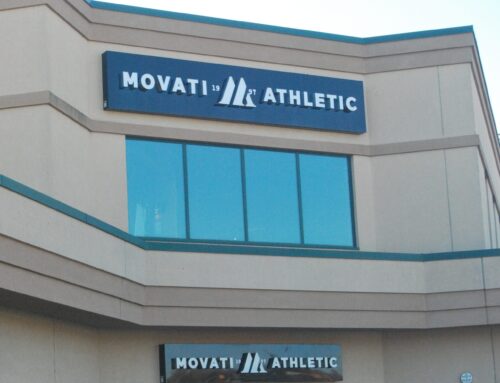
Photo by Max de Liberato
Imran Abdool
Instructor of Economics at Odette Business School, University of Windsor
Imran Abdool told The Times that different economies impacted in different ways. He talked about manufacturing economies like in Windsor, agricultural commodity-based economies as in the Kingsville and Leamington area, as well as knowledge-based economies.
Abdool said that COVID challenges each economy differently — manufacturing more so than agricultural, and agricultural more than a knowledge based-economy. Each economy has its own set of risks and rewards.
Possible exposure to the virus is a risk. Loss of working hours for some fields is a risk. Decreased commute times is a reward for others. For instance, you’re more likely to get a stable line of credit for a home right now if you have a secure job, according to Abdool.
He said that the different economies aren’t subject to the same trends, and that our economy is going through a K-shaped recession. This means that different parts of the economy will recover at different times.
“Think about people who are blue collar workers. They’ve been challenged with shut down, sporadic schedules with their job, even the government support programs are somewhat difficult to use,” said Abdool.
“If you look at the news, there’s people having trouble accessing the systems and getting their applications through. So in Canada certainly you have K-shaped recovery.”
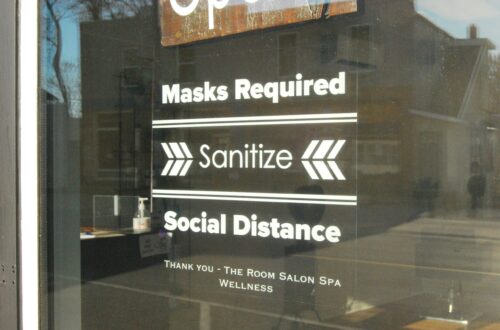
Photo by Max de Liberato
Abdool said that the economy can be thought of as a four-cylinder engine, with four components: business investment, spending, exports, and government spending.
If businesses reduce spending because consumers are buying less, people are worried about their jobs. Or if there’s been change in the business, sometimes the only thing in the economy that can make up for that is government spending.
This is what governments are trying to do through support programs such as CERB, loans or other forms of support. While there is room for improvement, Abdool said, they are trying to make up for this temporary lack of demand.
“It’s difficult, you know. The best thing businesses can do right now is try to make use of government programs as much as possible and see the big picture,” said Abdool.
“The world has faced several crises, whether it was the global financial crisis, or the Spanish flu 100 years ago, these things do subside. You don’t know when therapeutics will come along, but it will subside.”
Despite the enormity of the challenges, Abdool urged people to persevere.
“What businesses need to do they need to think about ‘How do we find that stop gap?’ whether it’s to do with employees saying, ‘We need some flexibility,’ or whether it’s making sure you understand all the government programs, reaching out to your member of parliament, working with your accountants, making sure that you can maximize all the benefits,” he said.
“Don’t get discouraged, there is light at the end of the tunnel. You just have to hang in there a bit longer.”
More information:
The Room Salon Spa Wellness
Address: 100 County Rd 34, Cottam, ON N0R 1B0
Phone: (519) 890-4823
Facebook: https://www.facebook.com/theroomsalon.spa.wellness/
Movati Athletic
Address: 313 Main St E, Kingsville, ON N9Y 3S9
Phone: (519) 733-1100
Facebook: https://www.facebook.com/MovatiAthleticKingsville/
Website: www.movatiathletic.com/kingsville
Sources:
Interview with Jocelyn Battersby
Interview with Sue Stephens
Interview with Imran Abdool

